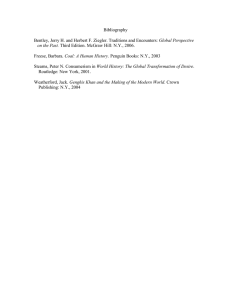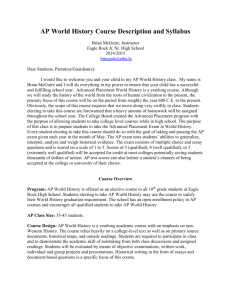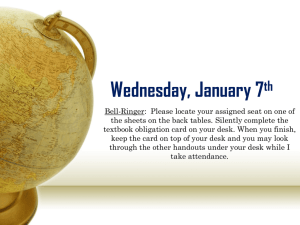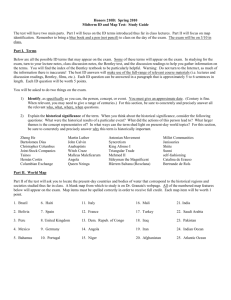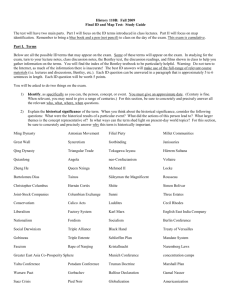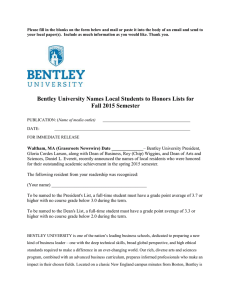San Diego State University Syllabus World History
advertisement
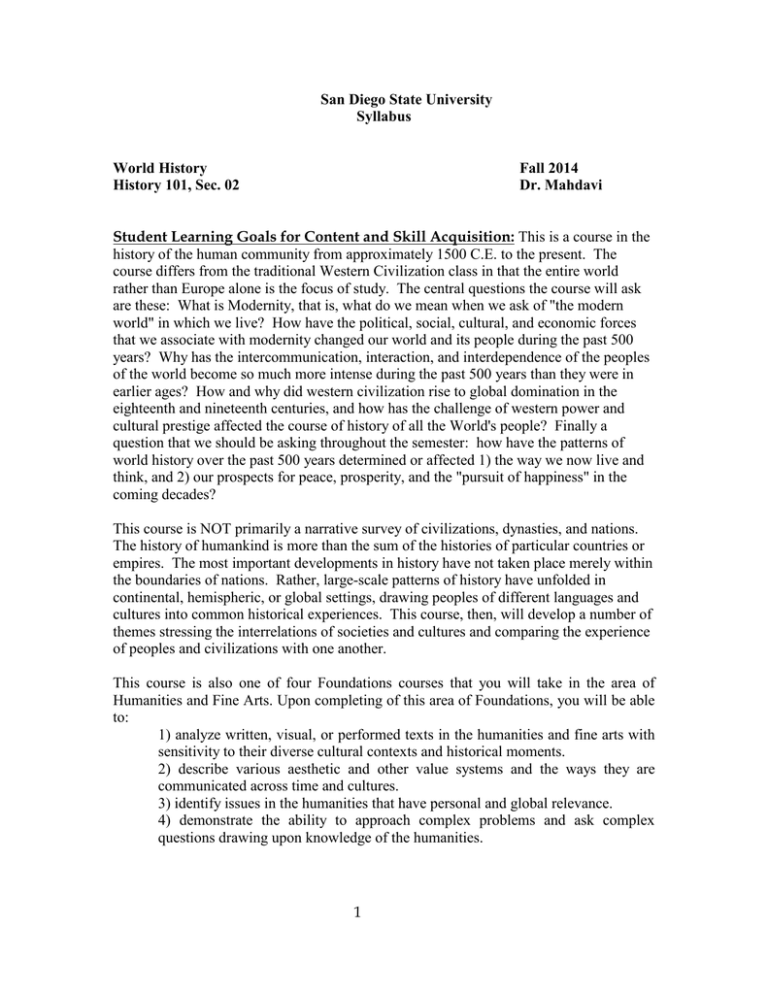
San Diego State University Syllabus World History History 101, Sec. 02 Fall 2014 Dr. Mahdavi Student Learning Goals for Content and Skill Acquisition: This is a course in the history of the human community from approximately 1500 C.E. to the present. The course differs from the traditional Western Civilization class in that the entire world rather than Europe alone is the focus of study. The central questions the course will ask are these: What is Modernity, that is, what do we mean when we ask of "the modern world" in which we live? How have the political, social, cultural, and economic forces that we associate with modernity changed our world and its people during the past 500 years? Why has the intercommunication, interaction, and interdependence of the peoples of the world become so much more intense during the past 500 years than they were in earlier ages? How and why did western civilization rise to global domination in the eighteenth and nineteenth centuries, and how has the challenge of western power and cultural prestige affected the course of history of all the World's people? Finally a question that we should be asking throughout the semester: how have the patterns of world history over the past 500 years determined or affected 1) the way we now live and think, and 2) our prospects for peace, prosperity, and the "pursuit of happiness" in the coming decades? This course is NOT primarily a narrative survey of civilizations, dynasties, and nations. The history of humankind is more than the sum of the histories of particular countries or empires. The most important developments in history have not taken place merely within the boundaries of nations. Rather, large-scale patterns of history have unfolded in continental, hemispheric, or global settings, drawing peoples of different languages and cultures into common historical experiences. This course, then, will develop a number of themes stressing the interrelations of societies and cultures and comparing the experience of peoples and civilizations with one another. This course is also one of four Foundations courses that you will take in the area of Humanities and Fine Arts. Upon completing of this area of Foundations, you will be able to: 1) analyze written, visual, or performed texts in the humanities and fine arts with sensitivity to their diverse cultural contexts and historical moments. 2) describe various aesthetic and other value systems and the ways they are communicated across time and cultures. 3) identify issues in the humanities that have personal and global relevance. 4) demonstrate the ability to approach complex problems and ask complex questions drawing upon knowledge of the humanities. 1 Examinations and Map quiz: There will be one full-period examination during the mid-semester, plus a final exam during the testing period in December. These exams will consist of essay questions only. In addition, we will have a 15-minute Map Quiz on September 12th. A study guide for the map quiz is provided and enclosed to your class syllabus (see page seven.) Quizzes We will have six random quizzes during the Fall semester. All six quizzes would be in form of multiple choices. Questions will invariably relate to the assignment of that day, please read the daily assignment before coming to class. There will be no make-ups of random quizzes for any reason. (Please do not ask!) Rather in calculating final grades, a student’s one lowest quiz grade (including “zero” grade for absence) will be dropped. Term Paper After choosing your topic, write one paragraph describing how you would approach discussion of your topic and provide your sources as well. The period of your paper should be within/from early 1500s to present time. Your topic should be very specific and narrowed down. For example: political events, economic systems, or social issues are very specifics. Avoid biography!! The term paper topics will be due on Monday, October 2oth. 1. 2. 3. 4. 5. 6. 7. It should be between 4-5 pages (typed and double spaced) in length. Use at least three sources; they should be a combination of articles and books or books alone, other than your textbooks. In addition to your three proper sources, you may use Internet sources with the sites that are edu or org domain. The following site has excellent academic articles that may be useful to you. Scholarly Journal Archive (http://www.jstor.org) Your paper should have an Introduction, Theme/Body, and a Conclusion. Your paper should contain a Chicago style bibliography of your sources (see http://bcs.bedfordstmartins.com/resdoc5e/RES5e_ch10_s1-0001.html ) Use Chicago style footnotes or endnotes when quoting or citing data (see http://bcs.bedfordstmartins.com/resdoc5e/RES5e_ch10_s1-0001.html ) Do a spelling and grammar check on your final paper. Turn your report in by the deadline if you do not wish to be penalized for an overdue paper. ½ letter grade penalty will be applied for each past due day. The term paper will be due on Monday, November 24th. Participation: Keep in mind that each class lecture of discussion is part of a continuing story. When you skip class, you miss some of the plot and you will soon be lost. Therefore, I am allocating 5% (extra credit) for class participation. It will be awarded to those students who continuously participate throughout the semester. 2 Grade Determination: Map Quiz (100 points) Random Quizzes (100 points) Term Paper (100 points) Mid-term Examination Final Examination 10% 10% (5 quizzes in all) 20% 30% 30% You will receive both a numerical score and a letter grade for each exam. Criteria for grading would as follow: 93-100% A 80-82% B- 67-69% D+ 90 – 92% A- 77-79% C+ 63-66% D 87-89% B+ 73-76% C 60-62% D- 83-86% B 70-72% C- 0-59% F Students with Disabilities If you are a student with a disability and believe you will need accommodations for this class; it is your responsibility to contact Student Disability Services at (619) 594-6473. To avoid any delay in the receipt of your accommodations, you should contact Student Disability Services as soon as possible. Please note that accommodations are not retroactive, and that I cannot provide accommodations based upon disability until I have received an accommodation letter from Student Disability Services. Your cooperation is appreciated. Plagiarism: Academic integrity is an important aspect of learning. Students must realize that cheating in quizzes and exams are serious offenses and will result in possible failing grade for the course. For university policies on cheating and plagiarism, see SDSU General Catalogue for more information. Classroom Etiquette: Please turn off all cell phones, smart phones, Blackberries, iPods, iPhones, Blue Tooth headsets, and/or any other form of electronic communication while in class. Calling, texting, or listening to music in class will not be tolerated, nor will using your computer for any purpose other than taking notes. Office: Telephone: Office Hours: E-mail: Arts and Letters: 559 619/594-8459 M; 1:00-3:00pm. WF; 1:00-2:00pm. and by appointment mahdavi@mail.sdsu.edu 3 Required readings: J. Bentley & H. Ziegler, Traditions and Encounters: A Global Perspective on the Past. Volume II, Fifth Edition Chinua Achebe. Things Fall Apart. Ngugi Wa Thiong’o. Weep Not, Child World Map (Robinson Projection) No 9DD96 from Herff Jones, Inc.: (purchase two copies) Week1 August 25 Introduction August 27 The Geography of World History August 29 The Shape of World History About 1500 C.E. Week 2 September 1 Holiday: Labor Day September 3 Sources of European Power Bentley & Ziegler, pp. 493-507 September 5 Sources of European Power (continued) Week 3 September 8 The Great World Convergence (GWC) Bentley & Ziegler, pp. chapter 22 September 10 Group discussion: Consequences of the GWC Bentley & Ziegler, reread chapter 22 September 12 Map Quiz and Review Discussion Week 4 September 15 Power in the Center: The Islamic Empires Bentley & Ziegler, Chap. 27 September 17 Islamic Empires (continued) Bentley & Ziegler, reread Chap. 27 September 19 The Chinese Empire in a Changing World Bentley & Ziegler, Chap. 26 4 Week 5 September 22 Atlantic Interrelations: Africa, Europe and the Americas Bentley & Ziegler, Chap.24 September 24 Atlantic Interrelations (continued) Bentley & Ziegler, pp. Chap.25 September 26 Capitalism and European Power Bentley & Ziegler, pp. 508-520 Week 6 September 29 Expanding Power in Russia Bentley & Ziegler, pp. 504-506 & 713-717 October 1 Modernity and the Islamic World Bentley & Ziegler, pp. 608-613 and 707-712 October 3 Review Discussion Week 7 October 6 Mid-Term Examination October 8 Revolutions in the Atlantic World Bentley & Ziegler, chapter 28 October 10 Revolutions in the Atlantic World (continued) Bentley & Ziegler, reread chapter 28 Week 8 October 13 Capitalism and Industry in Europe Bentley & Ziegler, Chap. 29 October 15 Capitalism and Industry in Europe (continued) Bentley & Ziegler, reread Chap. 29 October 17 The Growth of Neo-Europe in the 19th Century Bentley & Ziegler, pp. 743-746 5 Week 9 October 20 Group discussion of Achebe’s, Things Fall Apart Achebe, read the entire book Term Paper topics are due October 22 Islamic States and the World Economy in the 19th Century Bentley & Ziegler, pp. 705-712 October 24 Latin America and the World Economy Bentley & Ziegler, reread pp. 634-636 and chapter 30 Week 10 October 27 Film: Modernizing of Japan and discussion (Media Center : TV3123V) Bentley & Ziegler, pp. 724-728 October 29 Europe's New Imperialism Bentley & Ziegler, chapter. 32 October 31 African and Asian Responses to the New Imperialism Bentley & Ziegler, reread chapter 32 Week 11 November 3 World War I: The First Global War Bentley & Ziegler, Chap. 33 November 5 World War I: The First Global War (continued) November 7 World War I: Aftermath Bentley & Ziegler, chapters 34 and 35 Week 12 November 10 World War I: Aftermath Bentley & Ziegler, reread chapters 34 and 35 November 12 World War II Bentley & Ziegler, chapter 36 November 14 World War II (continued) Bentley & Ziegler, reread chapter 36 6 Week 13 November 17 Nationalism and New Power in the Developing Countries Bentley & Ziegler, chapter 37 November 19 Nationalism and New Power in the Developing Count. (continued) Bentley & Ziegler, reread chapter 37 November 21 Group discussion of Ngugi’s, Weep Not, Child Ngugi, read the entire book Week 14 November 24 Term papers are due The Formation of a Bipolar World Bentley & Ziegler, read pp. 853-861 November 26 The Formation of a Bipolar World Bentley & Ziegler, reread pp. 853-861 November 28 No Class - Thanksgiving Recess Week 15 December 1 The Price and Promise of Modernity Bentley & Ziegler, Chap. 38 December 3 The Price and Promise of Modernity (continued) Bentley & Ziegler, chapter 38 December 5 Group discussion: World since 1991. Week 15 December 8 Conclusion December 10 Review Discussion Final Examination: Monday, December 15, 10:30am.-12:30pm. 7 World History History 101 Dr. Mahdavi Fall 2014 STUDY GUIDE FOR MAP QUIZ (to learn the terms on this page, use the following link: http://www-rohan.sdsu.edu/~drizadi/) A fifteen-minute map quiz will be given on September 12th You will be asked to locate on a world outline map 20 of the items listed below. The instructor will choose the items (5 points for each). The blank map is available in the bookstore. Please buy two copies, one to bring to class and the other one for practice. You are responsible for bringing your blank map to class on the day of the test. OCEANS AND SEAS Aegean Sea Arabian Sea Bay of Bengal Caspian Sea East China Sea South China Sea Indian Ocean Persian Gulf Red Sea Black Sea Mediterranean Sea ISLANDS Ceylon Crete Cyprus Japan Philippines Sicily East Indies (Indonesia MOUNTAINS Alps Altai Andes Atlas Himalayas Hindu Kush Tien Shan Urals STRAITS & PASSES Bosphorus Dardanelles Str. of Bab al-Mandeb Str. of Gibraltar Str. of Hormuz Str. of Malacca RIVERS Amu Darya (Oxus) Danube Elbe Euphrates Nile Ganges Hwang Ho (Yellow Indus Niger Syr Darya (Jaxartes) Tigris Volga Yangtze Rhine MISCELLANEOUS Anatolia (Asia Minor) Cape of Good Hope Cape Horn Sahara Desert Gobi Desert Mongolia Kalahari Desert 8 CITIES Aden Alexandria (Egypt) Athens Berlin Brussels Cairo Cordoba (Spain) Damascus Delhi Genoa Hong Kong Jerusalem Lima Lisbon Mecca Mombasa Moscow Paris Peking Rome Santiago Shanghai Stockholm Timbuktu Tokyo Venice Zanzibar
